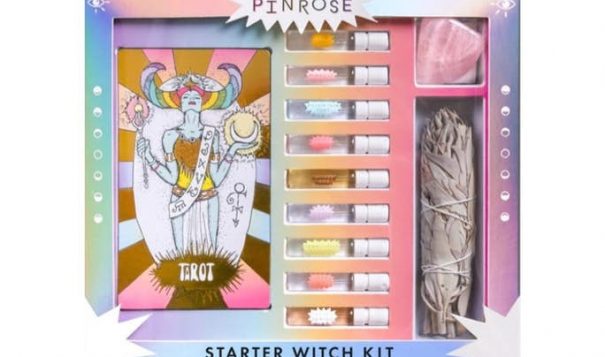 Witches mad at Sephora for selling a starter witch kit. (Girlfriend Magazine)
Witches mad at Sephora for selling a starter witch kit. (Girlfriend Magazine)
Native people on social media are calling cultural appropriation on a “starter witch kit” to be sold by Pinrose and Sephora starting Oct. 9.
The $42 product is created by Pinrose, a perfume company that sells their products in Sephora stores and online. The kit includes a white sage bundle, nine tiny bottles of perfume, tarot cards, and a pinrose quartz crystal, according to Quartzy.
Sephora shoppers are not happy and said on social media they will stop shopping at the mainstream makeup store due to the appropriation of white sage, a medicine used by many tribal cultures for prayer.
Johnnie Jae, Otoe-Missouria and Choctaw of Oklahoma, said her initial disappoint was “sadness,” not “anger or disappointment. “It was sadness because how many times do we have to watch what we hold sacred be destroyed and commodified for the sake of entertainment and profit for non-Native peoples.”
Jae, a co-founding board member of Not Your Mascot, talks about the relationship between sage and Native people.
“What hurts the most about this for me is thinking about the relationship that we have to sage, cedar, sweetgrass and other ceremonial plant life. We respect it, we honor it,” she said. “The way that we gather it even….it’s not just that we only take what we need, but that we offer a prayer and gift in exchange for what we are taking to maintain balance, to honor the spirits of the land and Creator.”

Like some on Twitter, Jae cites the 1978 American Indian Religious Freedom Act, a law allowing Native Americans, Alaskan Natives and Native Hawaiians to practice and preserve their traditions, ceremonies, “access to religious sites, use and possession of sacred objects.” One of those sacred objects being sage.
What makes it frustrating to Jae is this is being referred to as a “witch kit.”
“As Indigenous people, our ceremonies and even our dances have been seen as witchcraft, as evil, which led to our practices being outlawed,” she said. “Until 1978, we were not allowed to legally practice our ceremonies….which oddly enough was used to help witchcraft be legally defined as a religion and privy to the same constitutional protections as another religious group in ‘85.”
She’s right.
In the 1985 case of Dettmer v. Landon, 29-year-old Herbert Dettmer said prison officials were not granting him access to his “religion’s worship materials” while in the Powhatan Correctional Center in State Farm, Virginia. The case was argued as a violation to the First Amendment in the Constitution, “Congress shall make no law respecting an establishment of religion, or prohibiting the free exercise thereof.” Dettmer’s religion was the Church of Wicca, informally known as Pagan witchcraft or Wicca Craeft. With the help of the 1978 law, Dettmer won his case and was free to practice his religions and use his materials with conditions.
As a Sephora shopper, Jae will no longer give the company her business.
Korina Emmerich, Puyallup, echoes Jae’s thoughts on the law just passed 40 years ago. The 33-year-old fashion designer participated in the Vancouver Indigenous Fashion Week last year and said conversations focused on cultural appropriation. It’s why the event exists.
“Cultural appropriation is a serious issue in the fashion industry,” Emmerich said, who competed in season 13 of Project Runway.
She said when organic cotton become a trend, it was extracted and now it’s manufactured to meet the demand. Her brand, EMME, was created with sustainability in mind. They only do direct-to-consumer sales to avoid overproduction.
“Anything in fashion, the higher the production, the more ecological threat is it,” she said who is also concerned about no fair-trade and no fair-wage. “To think that could happen to sage and medicines for purely the commodification of it is disconcerting.”

Emmerich has friends who are into New Ageism and use sage. “They’re using it to an extinction.” Those friends, and for others who use it, she says, “have a responsibility” and asks them “to consider what the actual meaning of these medicines are, where it’s used, and the effects on tribal nations.”
On Twitter, Kaitlin Curtice talked about the sacredness being taken away from the medicines when they are packaged and sold. She burns sage with her two children before going to school in the mornings so “they can remember who they are.”
Curtice continued to say in the Twitter thread that the witch kits “further erases our cultures.”

Native Appropriations founder Adrienne Keene wondered if Pinrose or Sephora will follow in the footsteps of Urban Outfitters.

“Urban Outfitters stopped selling it after the interact reaction, so maybe Pinrose and Sephora will take a hint,” Keen said in a tweet on Monday.
Social media called out Urban Outfitters and The Local Branch in 2015 for selling white sage kits that came with an abalone shell.
According to the Urban Outfitters’ website, the white sage kits are “no longer available” and “sold out.”



Sephora and Pinrose have not responded to Indian Country Today’s request for a comment.
Jourdan Bennett-Begaye, Diné, is a reporter/producer for Indian Country Today in Washington, D.C. Follow her on Twitter @jourdanbb. Email: jbennett-begaye@indiancountrytoday.com
